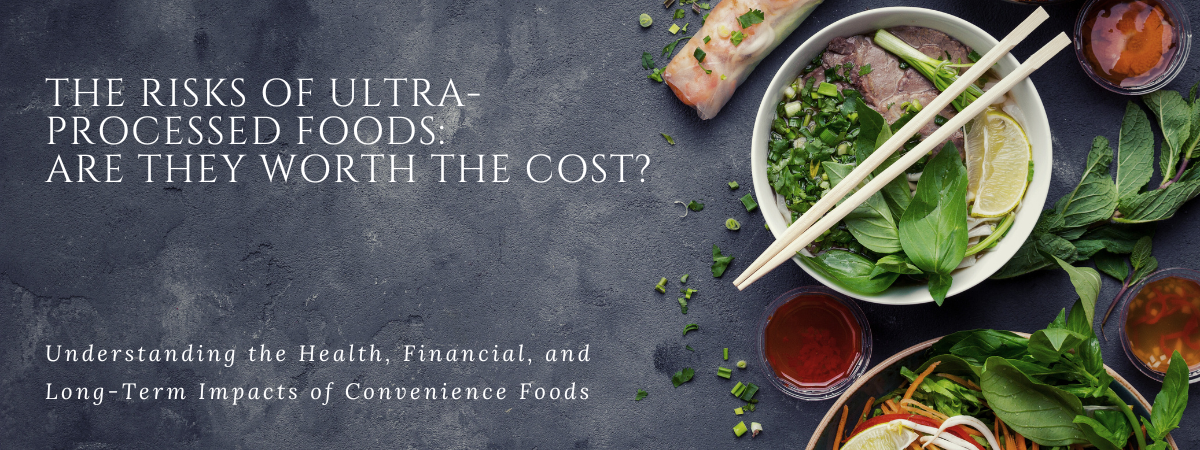

Gunja Parikh, MS, RDN, LDN
In today’s fast-paced society, ultra-processed foods (UPFs) have become a dietary staple for many. From frozen dinners and packaged snacks to instant noodles and sugary beverages, these foods offer convenience and affordability. However, growing research suggests that the true cost of ultra-processed foods extends beyond the grocery bill, impacting long-term health, nutrition, and even healthcare expenses. This article explores the risks of UPFs and whether their convenience outweighs their dangers.
What Are Ultra-Processed Foods?
Ultra-processed foods are industrial formulations typically made from ingredients not commonly used in home cooking, such as preservatives, flavor enhancers, colorings, and emulsifiers (Monteiro et al., 2019). They often contain high levels of added sugars, unhealthy fats, and salt while lacking essential nutrients like fiber, vitamins, and minerals. These foods are designed to be hyper-palatable and are often marketed aggressively, making them a regular part of the modern diet.
Examples of ultra-processed foods include:
-
- Packaged snacks (e.g., chips, cookies)
-
- Sugary drinks (e.g., soda, energy drinks)
-
- Instant noodles and soups
-
- Processed meats (e.g., sausages, hot dogs)
-
- Frozen ready-to-eat meals
Health Risks of Ultra-Processed Foods

1. Chronic Diseases
Numerous studies have linked ultra-processed food consumption to an increased risk of chronic diseases such as obesity, type 2 diabetes, cardiovascular disease, and even certain types of cancer (Srour et al., 2020). These foods are often high in calories but low in nutritional value, which can lead to overeating and weight gain.
2. Nutritional Deficiencies
Because ultra-processed foods are low in essential nutrients, relying on them can lead to deficiencies in key vitamins and minerals. This can weaken the immune system and increase the risk of various health problems over time (Chen et al., 2021).
3. Gut Health
Ultra-processed foods may negatively impact gut health. Artificial additives and lack of fiber can disrupt the balance of gut microbiota, leading to digestive issues and inflammation (Chassaing et al., 2017).
4. Mental Health
Emerging research suggests a link between diet and mental health. Diets high in ultra-processed foods have been associated with a higher risk of depression and anxiety (Adjibade et al., 2019). While more research is needed in this area, it’s clear that what we eat can affect how we feel mentally as well as physically.
5. Financial Costs
While ultra-processed foods may seem affordable in the short term, they can lead to higher medical expenses in the long run. Treating chronic diseases associated with poor diet can be costly, both for individuals and healthcare systems (Chen et al., 2021).
Making Healthier Choices
Reducing your intake of ultra-processed foods doesn’t mean giving up convenience altogether. Here are some practical tips for making healthier choices:
-
- Plan meals in advance to reduce the temptation of quick, unhealthy options.
-
- Cook in batches and freeze portions for future meals.
-
- Choose whole foods like fruits, vegetables, whole grains, lean proteins, and healthy fats.
-
- Read labels and avoid foods with long ingredient lists filled with unfamiliar terms.
Small changes can make a big difference. Swapping out just a few ultra-processed items each week for healthier alternatives can improve your overall well-being.

Conclusion
Ultra-processed foods may offer convenience, but the potential health risks and long-term costs make them a poor tradeoff. By making more informed choices and prioritizing whole, minimally processed foods, individuals can protect their health and reduce their risk of chronic disease.

Gunja Parikh
MS, RD, LDN
Gunja is a Licensed and Registered Dietitian with a passion for helping individuals improve their eating habits to reach their nutrition goals... READ MORE
